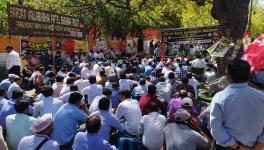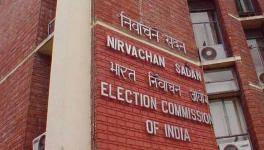All-India Strike by Bank Unions Demands 5-day Week, old Pension Scheme
File Photo
New Delhi: A five-day work week, restoration of the old pension scheme (OPS) and updating the pension amount are among the major demands of bank employees unions as they are set for a one-day nationwide strike on June 27.
The United Forum of Bank Unions (UFBU), a nine-member umbrella body of bank unions, gave a call for a strike on Thursday after a meeting in Mumbai attended by all the constituent unions.
Union leaders told Newsclick that the strike is primarily against the Indian Banks’ Association (IBA), a representative body of the management of state-owned banks and financial institutions that is sitting over a host of non-financial demands of the banking staff for many years now. Around 10 lakh employees are expected to join the strike if the issues are not immediately addressed.
‘Huge Workload, High Pressure’
The UFBU decided to give a strike call after deliberating the “undue delay by IBA in resolving the residual and pending issues”, the union said in a statement on June 9. Among the “important issues” that the bank unions are pressing for primarily include work week and pension.
“Both of these are among the major non-financial demands raised by bank unions for many years now. The unions want all Saturdays and Sundays to be holidays along with the scrapping of the National Pension Scheme (NPS). There are other pending issues as well,” Sanjeev K Bandlish, convenor, UFBU, told Newsclick over the phone.
These issues, according to Bandlish, have been raised multiple times by the unions during the conventional wage negotiation talks but to no avail. “We were assured of a resolution several times by the IBA but nothing happened,” he added.
Currently, the second and fourth Saturday of every month is an off day for all bank employees while direct benefits under the OPS have been discontinued for staff who joined after April 2010. The latter decision was taken during the ninth bipartite settlement while the former was secured in the subsequent 10th such settlement.
Unlike other public sector companies, wage negotiations in the banking industry are an outcome of an agreement between bank unions and the IBA—wage revision takes place after every five years. The latest 11th bipartite wage deal was signed in July 2020.
Wage negotiations, which usually continue for years before concluding in a common understanding between the two parties traditionally have unions also raising demands related to the service conditions.
Likewise, during the 10th bipartite wage talks, the demand for a five-day week was raised for the first time by the unions.
“The IBA had told us that it will allow off days on two Saturdays every month on an experimental basis after which the five-day week demand will be considered. Subsequently, permission from the RBI and the Central government was taken, private and foreign banks reached a consensus and an improvement in service conditions was eventually achieved,” Bandlish explained. The 10th bipartite settlement, which covered 43 banks, was signed in May 2015.
The issue of a five-day week resurfaced during the 11th bipartite wage negotiations only to be discussed later as agreed by both parties. However, not a single meeting was convened by the IBA since then despite multiple requests by unions to hold discussions, as per the agreement.
Soumya Dutta, general secretary, All India Bank Officers’ Association (AIBOC), told Newsclick that the unions are demanding from the IBA to immediately convene a meeting to discuss the service conditions.
“More than 65% of the banking staff is under 40 years of age, have a huge workload and are under high pressure of achieving targets. A five-day work week will ease their work pressure and it is also important for their weekly rejuvenation,” Dutta said.
However, any change in the work week, as in the past, will not be possible without the nod of RBI, Centre and private banks.
Bank Staff Flay Market-Linked NPS
Meanwhile, given the risks associated with the market-linked new pension scheme, the unions are also pressing for the restoration of OPS. The OPS, which was replaced with the NPS in April 2010 for employees recruited after April 1, 2010, had numerous advantages, according to Dutta.
The OPS was implemented under the Central Civil Services (Pension) Act, 1972, under which there was no employee contribution and the pensioner received 50% of the last drawn salary. As opposed to it, the NPS, introduced by the then-Atal Bihari Vajpayee government in December 2003, is a contribution-based pension scheme.
The pension amount is linked to the market and fails to work as a safety net for employees. The scheme has also invited flak from numerous sections of government employees across the country.
More than half of the staff in public sector banks is covered under NPS, Dutta informed Newsclick lamenting that these employees deserve a better plan to safeguard their retirement period. “We are also demanding revision of pension rates for employees covered under the OPS.” According to Dutta, unlike with Central government employees, the basic pension, barring dearness allowance, has not been revised for public sector banking staff since 1995.
Get the latest reports & analysis with people's perspective on Protests, movements & deep analytical videos, discussions of the current affairs in your Telegram app. Subscribe to NewsClick's Telegram channel & get Real-Time updates on stories, as they get published on our website.
























